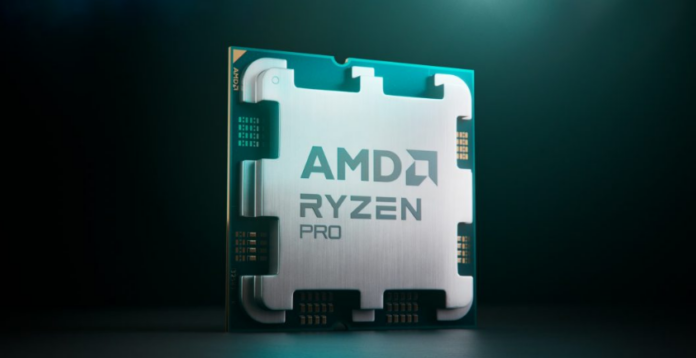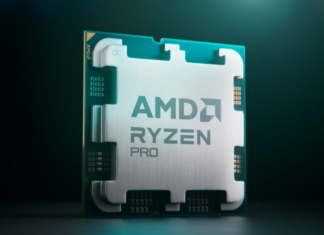AMD has announced the new Ryzen Pro 8040 for laptops, as well as Ryzen Pro 8000 models for desktops. Both lines promise a lot of performance in professional activities. But what stands out about them is the incorporation of a neural processing unit (NPU). It’s AMD reinforcing the idea of the “AI PC”.
An NPU handles artificial intelligence tasks, leaving the CPU and GPU free for other workflows. The component is nothing new for AMD. In fact, the company was the first to introduce an NPU on x86 chips. Today’s announcement broadens the feature in the enterprise segment, the focus of Ryzen Pro chips.
AMD Ryzen Pro 8040 for Laptops
Focused on corporate notebooks, the AMD Ryzen Pro 8040 line has models with six or eight cores and a maximum TDP of 54 W. These units try to reconcile good performance with battery life, therefore.
AMD cites, as an example, that the Ryzen 7 Pro 8840U is about 30% faster than the Intel Core Ultra 7 165H, but tends to consume less power.
In the desktop segment, AMD’s novelties are the Ryzen Pro 8000 APUs (models with integrated GPU) with four, six or eight CPU cores.
Note that models with a “GE” ending require less power, as their TDP is only 35 W. Overall, the Ryzen Pro 8000 series repeats the promise of high performance combined with energy efficiency.
Compared to the Ryzen 8000 series for home computers, the Pro line differentiates itself mainly by the availability of the AMD Pro Technologies package (also available in the Ryzen Pro 8040 series), which includes features for the enterprise segment, such as AMD Memory Guard to protect memory with encryption.
For AI PC, but not too much
According to AMD, the new chips achieve 16 TOPS of NPU performance, which corresponds to 16 trillion operations per second. Despite this, none of the new processors meet the requirements of an AI PC, of 40 TOPS.
It’s not a demerit of AMD. Not even the Intel Core Ultra Meteor Lake line reaches 40 TOPS currently. What happens is that the AI PC proposal is very recent. The concept is still in development, so much so that Microsoft has been working with AMD and Intel to refine the proposal.
Because of this, an AI PC capable of predominantly handling artificial intelligence tasks locally (without relying on internet access) will be something for the next generations of AMD and Intel processors.










